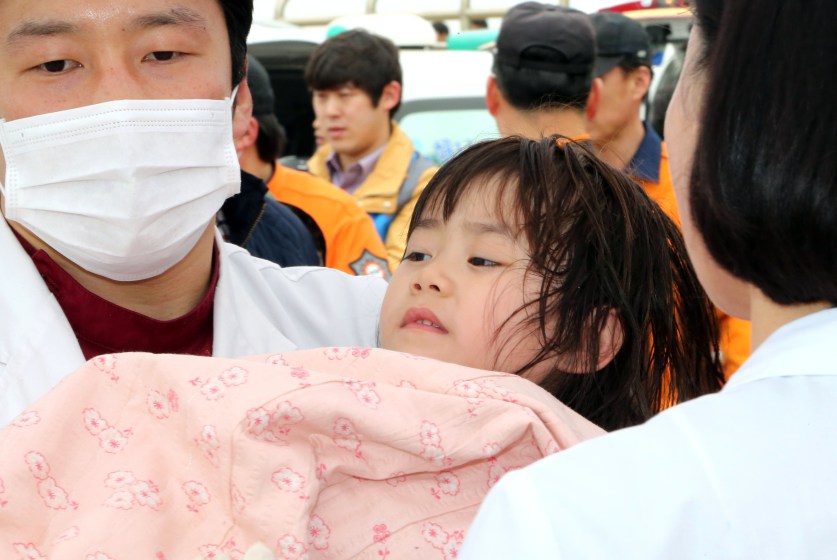Pictured is one of the young survivors of the South Korean ferry sinking. (Photo via Getty)
As many of us—parents especially—empathize deeply with the pain of the families of the South Korean ferry victims, we also find ourselves wondering how to talk about this tragic incident involving so many children with our own kids. KoreAm looked back to our February 2013 issue, when mental health columnist Dr. Esther Oh gave some valuable advice on how to help our youth deal with trauma, in the wake of the Sandy Hook Elementary School shooting. We revisit that advice here.
How Do We Talk to the Children?
In light of the December shooting at Sandy Hook Elementary School, mental health columnist Dr. Esther Oh dispenses advice on how to help our youth deal with trauma.
by DR. ESTHER OH
My eyes are glued to CNN, and it’s hard to digest the headline I’m seeing: “Gunman kills 20 elementary school students.” I am left speechless, as more news surfaces about the gunman, who took the lives of 20 young children and six adults. Weeks later, the details are still chilling.
It’s hard to imagine how the victims’ families and friends—as well as the survivors—can return to their lives after this horrific incident. Such tragedies often make us think about how we would handle such a situation if we were ever faced with it. The truth is, many of us will also face some form of trauma in our lives, such as the death of a loved one or a natural disaster. After the initial shock wears off, most adults are able to process what happened, with support from others, and eventually move on in life.
Children and teenagers, however, differ. They’ll undergo a range of reactions, based on their age, previous experiences and understanding of the world. They’ll often turn to adults for answers and comfort. Knowing ahead of time how to deal with such events will help you take care of yourself and also prepare you to talk to your own children in an effective and healthy way.The first step is to talk to them. Silence or flat-out lying about a traumatic event can make children think that what has occurred is too horrible to speak about and they should avoid their emotions. Instead, initiate the conversation to let them know it’s healthy to talk about their feelings. Here are some other tips:
§ Reassure they are safe. When they experience or hear about a trauma, children want to know you care for them and want them to be safe. Explain to them that, even though there is no guarantee that something bad will never happen, you are here to protect them. Emphasize that safety authorities, such as the police and fire departments, are there to help in times of need.
§ Help them express their emotions. Encourage them to ask questions and accept their feelings. Reiterate that it’s OK to feel sad, upset or stressed when dealing with these types of events. But if they aren’t ready to talk, it’s best not to force them. Instead, be patient. Sometimes it’s easier for them to express their emotions in other ways, such as writing or drawing.
[ad#336]
§ Keep your discussions developmentally appropriate. Very young kids only need brief, simple information combined with reassurance that they are safe. Older children will understand more, so it’s helpful to ask if they have any questions. Teens may withdraw or deny their emotions, both of which are completely normal. But they may also have strong opinions they want to express. Listen and encourage healthy communication.
§ Review safety procedures. Going over a safety plan can be useful and help reduce anxiety. This can empower children to play an active role in keeping their schools and homes safe. Teach them to reach out to an adult if they see or hear anything that makes them feel uncomfortable or scared.
§ Limit their media exposure. The news these days can be developmentally inappropriate for children and can cause more anxiety and confusion. What’s “normal” for us can provoke strong emotions in children.
§ Maintain a normal routine. It’s helpful to keep a regular schedule of sleep, meals, exercise, school and extracurricular activities. Doing this reassures kids that some things are predictable in life and poses as a good distracter.
§ Observe your child’s emotional state. If they’re not expressing their concerns verbally, gauge how they’re doing by monitoring changes in behavior, school performance, appetite and sleep patterns. Such changes may indicate they are struggling emotionally.
§ Be a good role model. Lead by example and demonstrate to your children how to deal with stress in a healthy way. Be open to talking about your feelings, spend quality time with loved ones, and engage in enjoyable activities. What not to do: express emotions in unhealthy ways, such as screaming, throwing objects, cursing or turning to alcohol and drugs. Be mindful of what you say and do in front of them. Children are like sponges, soaking up things they see and hear. Try not to blame certain cultural, racial or ethnic groups or people with psychiatric problems if the cause of an event is human violence. Despite the chaos of our daily lives, I hope we can step out of our comfort zones and have the courage to talk about our feelings and openly listen to each other’s concerns. If those feelings ever get too overwhelming or negatively affect you, I hope you will be open to the idea of talking to a mental health provider.
___
Dr. Esther Oh, a psychiatrist at the Los Angeles County Harbor-UCLA Medical Center, writes a regular mental health column for KoreAm. Got a question? Email editor@charactermedia.com. All correspondence will be strictly confidential and only accessed by Dr. Oh. Opinions expressed here represent those solely of the author.
This article was published in the February 2013 issue of KoreAm.







